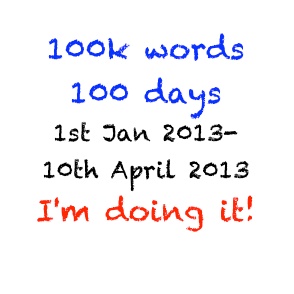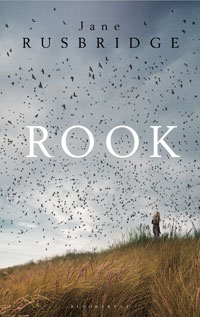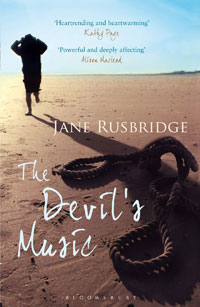First, there came National Novel Writing Month – often shortened to NaNoWriMo. The challenge? To write a 50,000 word ‘novel’ during the 30 days of November. First
NaNoWriMo remains very popular. In 1999, their first year, they had 21 participants and 6 winners. In 2011, they had over a quarter of a million participants and nearly 37,000 winners. The number of words logged in the 2011 event was 3,074,068,446. Over three billion words. Staggering.
However, there a couple of problems with NaNoWriMo:
1) The pace is pretty high, at 1667 words per day. The danger is that you type words, not create a story. Generally, I’ve been dissatisfied with my 8 NaNoWriMo winning ‘novels’
2) 50,000 words do not a novel make, especially that, by the time you’ve done some (necessary) editing, you’ll end up with something around 30,000 words.
Several other challenges have emanated from the NaNowriMo people. Camp NaNoWriMo is another 50k word novel month, in the month of July. Script Frenzy is the same, but for scriptwriting. And it doesn’t stop there. Others have created NaNoEdMo (editing), NaNoWriWee (30k in a weekend). There’s a ton of monthly timed artistic challenges at http://www.wikiwrimo.org/wiki/List_of_timed_artistic_challenges
So, with all these problems, is it worth doing a timed wordcount challenge? Bearing in mind that:
* You have to be prepared to work at it. Nothing worth having comes easily. You need to make compromises. You need to write when you don’t feel like it.
* You can feel down if you start falling behind. You need to either stick with the schedule, or not. If something gets in the way – illness, family issues, meteorites hitting the earth – you need to accept that you’re not going to achieve that target.
* You can end up with nonsense. Ernest Hemingway said “the first draft of anything is shit.” And it is. Mine are, anyway. That’s what the editing process is for.
However, there are a couple of huge positives:
* Having a regular, challenging schedule means that you need to write each day. This is a very good thing. And once you get into the habit of writing each day, you can’t stop. More writing = a better chance at gaining a publisher or more self-published works to offer to the public.
* You can feel that you have what it takes to become a novelist. This is also a good thing. We’re all delicate, fragile souls, and our confidence needs lots of bolstering.
How do you succeed at timed writing challenges? Here are some hints and tips I’ve used over the years.
* PLAN
I’ve seen many authors fail the challenges, but one of the biggest reasons is due to lack of planning. You really can’t write a novel without having a plan. An idea is not enough. An idea is not a plan. The plan is something which lists plot points, from the start, through the middle, and to the end. The plan lists your characters, with some sort of character definitions. The plan can be a chapter-by-chapter detailed definition of your story, but it needn’t be. Without the plan, your story will run out of ‘legs’, you will run out of story, before you complete the necessary words. And, with something like NaNoWriMo, there is no time for major replanning.
* WRITE EACH AND EVERY DAY
It sounds obvious. But some people don’t. They feel tired, they have a busy day at work, they have a family member fall ill. All valid reasons, sure enough, but if you can break through these barriers, write just a few words, a couple of sentences, maybe a paragraph or two – then you’ll stand a much better chance at succeeding.
* DON’T SPEND TOO MUCH TIME TALKING ABOUT WRITING
NaNoWriMo have forums for you to chat with your fellow challengees. They have individual local forums for people in your area. They have forums for your genre. They have technical question forums. They have forums for people to recommend writing resources and programs. And so it goes on. There are Facebook groups, Twitter hashtags, other forums. All of which take you away from what you are supposed to be doing – WRITING!
Restrict your non-writing social media efforts to a certain amount of time during the day. One of the best things I have found to do is to close down my browser when I’m writing. That little bit of effort to open up the browser and load websites takes just long enough for me to think carefully before doing it.
* LEARN TO WRITE IN SMALL BITES
One of the problems many challenge writers have is of finding time to write. We think to write 1000 words a day or more, we need a couple of hours of time away from other people, in silence or with the music of our choice, a glass of wine or a cup of tea, and a view to inspire our writing.
Wrong!
You need to put your writing instrument of choice in front of you, and write. I’ve written whilst food has been cooking. While watching TV. In between doing household chores. When the rest of the house has gone to bed. Before the rest of the house has woken up in the morning. Whilst waiting for an appointment. During a 15-minute tea break. During a lunch break. Learn to write in small sections, and with distractions. Learn to switch off from outside influences, and concentrate on your story. I can type at around 1,000 words an hour, creating fiction as I go. That’s four, quarter-hour segments, or six, ten-minute segments during the day. Can you find six, ten minute chunks of time to write. Sure you can!
* HAVE FUN
Yes, the challenge is about writing. And writing is work. Damned hard work. But you’re allowed to have fun, too. Chat to others about what you’re doing. If there’s a forum, join in. Read blogs that other writers offer. Here are a couple that might amuse or encourage you. Chuck Wendig is not everyone’s cup of tea, and he’s irreverent and some of his language may offend. But what he says is the truth, so please read them, and nod your head sagely, and remember who told you to read them!
http://terribleminds.com/ramble/2010/11/01/nanowhonow-nanowrimo-dos-and-donts/
http://terribleminds.com/ramble/2011/10/04/25-things-you-should-know-about-nanowrimo/
Good luck!




